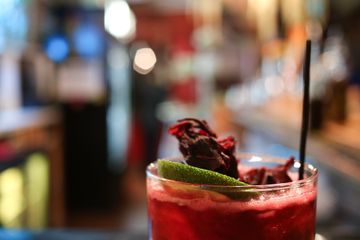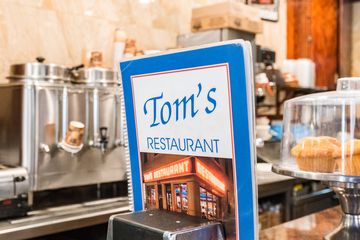Many who stand on the corner of 112th Street and Broadway will immediately recognize the facade of Tom's Restaurant. Its iconic sign (minus the "Tom's"! ) was used as the exterior of Monk's Cafe in the television sitcom, Seinfeld. The name of the eatery should also be familiar to those in the folk-pop world: Suzanne Vega wrote a song about Tom's, choosing to call both the track and her album "Tom's Diner. " That is where most people's knowledge stops. After visiting, however, I discovered that it also represents a slice of timeless New York life, with a history of its own. Inside, the diner appears to be identical to how it must have looked fifty to seventy years ago. Tom's Restaurant has existed since the 1940s, when the previous owner, whose last name was Kane, sold it to Thanasi, a Greek immigrant whose name is Anglicized to Thomas. Before the change in ownership, little is known about the establishment. I spoke to Mike Zoulis Sr., who said that based on an old, somewhat blurry photograph, he believes that the place was called "Kane's. " Tom was a hard-worker who, according to Mike, had been in restaurants his whole life. "He worked so hard he had back problems. " One day, Tom hired two Greek employees, one of whom was Minas Zoulis, which is how Mike's family got involved with the business. The restaurant continued to grow, in terms of followers, profits, and physical size: Tom bought the lot next door enlarging the restaurant to twice its original size. As Mike pointed out, however, the kitchen has remained the same - tiny compared to the rest of the space. Eventually, each member of the Zoulis family was given a share of the company. Mike Sr. took over in 1980. I found it interesting that Mike Jr., rather than being Mike Sr. 's son, is his cousin: "In Greece, the first-born takes the name of the paternal grandfather, so there are a lot of Mikes. "As Mike spoke to me, he sat behind the old fashioned cash register, surrounded by a wall of international currency. The sight rivaled that of the cases of muffins on the bar, as well as the red and cream booths, for nostalgia value. Suzanne Vega and Seinfeld memorabilia covered one wall, but otherwise, the diner functions as a neighborhood watering hole, where Columbia students, hospital workers, and local residents can come by for a bite to eat at almost any hour of the day or night. "We're getting people for the food, " Mike said. Instead of Seinfeld and Suzanne Vega fans, the diner gets dedicated diner-lovers. "It may seem surprising, but not to me, " Mike stated, noting that patrons have come to eat at Tom's from as far away as Australia. Mike credits the food quality with what goes into the dishes. After traveling through Europe, he realized, "The purer the ingredients, the better the food. " The pancakes, for example, are still made using the same formula that was created in the 1940s, involving fresh buttermilk and real olive oil. The only thing that has changed is the toppings with the addition of blueberries, chocolate, and banana nut pancakes in the 1990s. As for savory foods, Mikes calls the burgers, "equivalent to the best burgers in the city. ""Tom's is an institution here, " Mike asserted at the end of our conversation. He told me that whenever there is a tragedy or an event that disrupts normal life, whether it is the blackout in the 1970s or 9/11, Tom's is there. "We feel an obligation to the neighborhood, " he said, recalling that a lot of the elderly in the surrounding blocks had nowhere to eat, so Tom's stayed open for them. "Literally generations have grown up here, " Mike said. "Many still think of this as home. "


